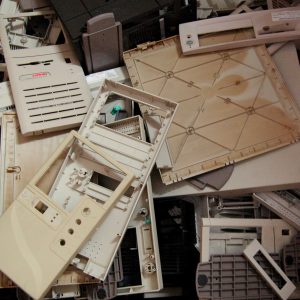A town in southern China that’s known as one of the world’s most notorious destinations for e-scrap is undergoing a government-mandated makeover.

A town in southern China that’s known as one of the world’s most notorious destinations for e-scrap is undergoing a government-mandated makeover.
Telecommunications giant AT&T has reached a $52 million settlement with the state of California for illegally dumping scrap electronics in state landfills.
 A study out of Europe highlights the environmental virtues of recycling plastics found in electronics, appliances and toys.
A study out of Europe highlights the environmental virtues of recycling plastics found in electronics, appliances and toys.

Converge currently has 23 employees. Photo credit: Rafael Reveles.
Global e-scrap firm Sims Recycling Solutions has launched a subsidiary that aims to optimize processing plants, including those run by Sims competitors.
The White House has issued an updated executive order on federal sustainability practices that noticeably leaves out green electronics standard EPEAT. The standard helps promote the recovery and reuse of many types of devices.
A Michigan e-scrap broker is facing up to five years in prison and a fine of $250,000 after pleading guilty to smuggling CRTs and other used electronics abroad.
 Sims Metal Management’s e-scrap business is generating less revenue but managing to increase earnings.
Sims Metal Management’s e-scrap business is generating less revenue but managing to increase earnings.
A year after beginning an operation to use treated CRT glass as alternative daily cover at a landfill in Illinois, Kuusakoski US says it is phasing out that approach in favor of a different strategy: storing CRT glass in a mineable cell.
Elected officials in Illinois are mulling an amendment to the state’s e-scrap legislation that would lead to higher manufacturer recycling goals and protections for local governments.
Introduced by Rep. Emily McAsey, a Democrat representing Illinois’ 85th District, the legislation picked up four chief co-sponsors in recent weeks following a reading in the Illinois House Environmental Committee.
“If some changes are not made, I’m concerned [some programs] will cease to be able to operate,” McAsey said during the meeting, according to the Joliet, Illinois-based Herald News. “There’s the possibility of widespread illegal dumping [of electronics].”
Rep. McAsey did not return a request for comment from E-Scrap News.
At its core, McAsey’s amendment would signal three significant changes to the state program currently in place. The first change would be to double the current manufacturer recycling requirement from 50 percent to 100 percent of what each company sells in the state. (Individual manufacturer goals are based on sales of electronics in the state “two years before the applicable year,” the law states.) In addition, the legislation would stiffen the penalty against OEMs failing to reach that 100 percent goal. The legislation also aims to ensure recycling firms and collectors don’t charge municipalities for collecting or taking material unless they offer specialized services, such as home pick-up.
Mark Denzler, vice president and chief operating officer of the Illinois Manufacturers’ Association (IMA), told E-Scrap News the group opposes the amendment but will engage in talks next year as part of a planned review of the program set forth by current legislation.
“The IMA opposes the current amendment that requires manufacturers to double their goals and significantly increase costs for the collection of e-waste,” Denzler said. “The original law was carefully negotiated and includes a mandatory review of the program in 2015. Our members are committed to sitting down with Rep. McAsey and local government officials to review the overall e-waste program with a goal of making it better for both manufacturers and consumers.”
One of the main challenges of the current legislative framework, proponents of the amendment say, is that manufacturer goals, at 50 percent, are too low and leave towns and cities with excess electronics to recycle. With CRT devices representing the vast majority of the end-of-life consumer electronics stream by weight in Illinois (and nationwide), that excess material is costly to process and responsibly recycle, causing municipalities to discontinue collection programs. Recycling firms, meanwhile, have begun to avoid the residential stream.
“We already have millions of people without service,” Marta Keane, a recycling specialist for Will County, told E-Scrap News. She said Will County’s recycling contractor, Vintage Tech, has continued to service the area despite no longer receiving manufacturer funding to do so, while numerous other counties, Keane noted, including DuPage County, are now without service. “Any day we could lose service,” Keane said.
A bill that had the potential to do away with North Carolina’s e-scrap program was revised before passing.
